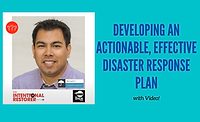The Intentional Restorer
Delegation, Dwight Schrute, and COVID-19

As we work together to create common sense responses to the COVID-19 situation, we can take a minute to laugh and learn from relevant situations that play out in the pop culture favorite TV series, The Office. In Health Care (Season 1, Episode 3), Michael Scott defers his managerial responsibility to choose a health plan for the staff to his right hand man, Dwight Schrute. Dwight turns the opportunity into a power grab and cloisters himself in the conference room, posting a sign “Dwight Schrute Workspace.” Even though Michael is willing to delegate this important decision to Dwight, he will not allow him to call the conference room his office.
We like our narratives to have good characters and bad characters as we seem to derive some false sense of comfort in labels. Dwight may be perceived as the bad guy, but at his core he does his best to do what he is asked. In this instance he is being asked to put the company first, cut costs and choose a plan. Jim on the other hand, deflects the opportunity to be of assistance. Dwight goes to the extreme. When his peers review the plan that Mr. Schrute has chosen they are upset, noting that he cut everything. Dwight is proud of his decisiveness,
“What did I do? I did my job. I slashed benefits to the bone. I saved this company money. Was I too harsh? Maybe. I don’t believe in coddling people. In the wild, there is no health care. In the wild, health care is, ‘Ow, I hurt my leg. I can’t run. A lion eats me and I’m dead.’ Well, I’m not dead. I’m the lion. You’re dead.”
When leaders delegate the tough decisions
People in a position of leadership like to use phrases like, “Delegate and elevate,” but as is observed in this episode of The Office, sending your responsibilities downstream does not create a good working environment. To delegate does mean to appoint another as your representative. By this definition Michael Scott, the manager of the office, did act in accordance with the definition. Unfortunately, too often, when someone delegates it’s because they have an assignment they don’t want to complete, such as cutting insurance benefits, and comes with zero preparation. If your process of delegating is to pass the mantle so someone else takes the heat, you are setting everyone up for failure.
Dwight D. Eisenhower, who served as a five-star general, commander of Allied Forces in Europe during WWII, and the 34th President of the United States, is credited with a simple system for prioritization. It has been referred to as The Eisenhower Method (see image), Box or Decision Matrix, but the basic principle is the same. In this matrix any person in a position of leadership must decide how best to use their most limited resources, time management. Author and coach Lex Sisney adds some valuable insights in his article When Not to Delegate. His axis includes the decision between level of conviction and degree of consequences. When a situation is of high conviction and low consequence it is a great opportunity for a leader to delegate for the purpose of developing others.
Step up to the plate or don’t complain
Jim Halpert is often viewed as the voice of reason, or that person in the office who has the potential to be a leader, yet in this instance he deflects the responsibility. Obviously, Michael is putting everyone in a bad spot, but it is better to have a seat at the table and a voice in important decisions than it is to allow the Dwight’s of the office to direct the conversation. Dwight becomes the villain and yet the origins of this debacle are handed down from a corporate office that needs to protect profits and their solution is to reduce benefits.
The healthcare debacle starts when Michael’s boss, Jan, tells him at the opening of the episode, “You know the whole reason that we’re doing this, is to save money. So you just need to pick a provider and choose the cheapest plan.” Headquarters defers to executives who defer to managers and Michael defers to Dwight. Rather than fix the issue, the elites get the masses to fight among themselves. Jim complains about the result but he also stepped away from the opportunity to be a part of the solution. In our current situation with coronavirus (SARS-CoV-2), we face the toilet paper apocalypse of 2020 where citizens are fighting each other to hoard products. There is still time to work together, take care of each other and be a part of the solution process.
This isn’t a TV show, it’s real life
The Office is fictional and yet so much of what makes comedy work is that there are elements of truth in the characters and the situations. If you watch the COVID-19 coverage or go to the grocery store, you can find Jans, Michaels, Dwights and Jims. Who are you going to be for yourself, your family and your community?
What is the government doing to help citizens and businesses impacted by coronavirus?
Remember, this is an unfolding situation and we should have some patience while everyone is working to understand and develop an effective response strategy. What have we seen with regards to any relief for the financial impact of coronavirus?
- On March 10, 2020, Italy's coronavirus mortality rate rose to 463, the second highest after China. The government placed the population of more than 60 million in lockdown and announced that mortgage payments would be suspended for up to three months.
- The Small Business Administration (SBA) has set up Disaster Relief Lending, “Our Agency will work directly with state Governors to provide targeted, low-interest disaster recovery loans to small businesses that have been severely impacted by the situation.”
- In an effort to keep businesses open and citizens employed, Germany offers "unlimited" loans to all German companies affected by the coronavirus in an effort to protect its economy from collapse.
- As of March 14, 2020 The Families First Coronavirus Response Act was adopted by the House of Representatives and will go before the Senate. The legislation, which is supported by President Trump, would ensure sick leave for affected workers and include money for testing for Americans, including the uninsured.
What can businesses do to help employees deal with COVID-19 burdens?
With news that schools will be closing in our area as a response to coronavirus, I am thankful that our kids are old enough that they don’t need constant supervision. My heart goes out to those families that will be impacted by their young children unexpectedly having to be at home for an extended period of time. News is unfolding where local communities are helping those most vulnerable with food, childcare and other essential resources. If you are able, contribute to local efforts.
If reducing interaction is a common sense approach to reducing exposure and slowing the spread of COVID-19, then working from home measures are one option to help this effort as well as develop business resiliency. Perhaps this situation will force many companies to experiment with remote work and in the long run, this may be a much better system for all involved. Working from home has many upsides. In the instance where an employee has young children who are now being forced to stay at home it may be a means of keeping business running while allowing team members to care for their families.
What can we do to help each other navigate this pandemic?
A pandemic means that the situation is global, the World Health Organization (WHO) has a chart which outlines the phase descriptions and actions during a pandemic. Their official statement from March 11, 2020, “Describing the situation as a pandemic does not change WHO’s assessment of the threat posed by this virus. It doesn’t change what WHO is doing, and it doesn’t change what countries should do.” For those who would question whether this is all being blown out of proportion, one thing to keep in mind is that we are in uncharted territory, “We have never before seen a pandemic sparked by a coronavirus. This is the first pandemic caused by a coronavirus.” The plan is evolving as everyone learns more about what we are dealing with.
- The best place to start, as the Center for Disease Control (CDC) and many others have noted, is to, “Know the facts about coronavirus disease 2019 (COVID-19) and help stop the spread of rumors.”
Some awesome stories of generosity are emerging:
- 19 year old rookie NBA player, Zion Williamson is covering the salaries for 30 days of arena workers for his team the New Orleans Pelicans. Zion says, "Unfortunately, many of them are still recovering from long term challenges created by Katrina, and now face the economic impact of the postponement of games because of the virus. My mother has always set an example for me about being respectful for others and being grateful for what we have, and so today I am pledging to cover the salaries for all of those Smoothie King Workers for the next 30 days.”
- There is a beautiful video going around of citizens collectively singing from their balconies in Italy.
Most of the information we are receiving include common precautions that we should be doing regardless of this situation, but we are being made acutely aware of the need for measures such as:
- Washing your dang hands
- Vampire coughing
- Staying home if you’re sick or have symptoms
- Creating a reasonable stock of essentials - remember your neighbors need to eat and wipe their bottoms as well
- Read Implementation of Mitigation Strategies for Communities with Local COVID-19 Transmission
- Joe Rogan hosted a good conversation with Michael Osterholm (The Joe Rogan Experience - Episode 1439), the director of the Center for Infectious Disease Research and Policy (CIDRAP), on his perspective on this recent viral outbreak.
Looking for a reprint of this article?
From high-res PDFs to custom plaques, order your copy today!






